
Visage/Stockbyte/Getty Images
Fenugreek, otherwise known as Greek hayseed and bird's foot, has a long history of therapeutic use for healing and relieving inflammation. Containing powerful antioxidants that yield significant benefits in treating liver and pancreas conditions, fenugreek is also used to treat digestive-tract disorders, diabetes and skin disorders. While further scientific research is needed to confirm the effectiveness of fenugreek in treating complexion issues, it has been a popular folk remedy for centuries in treating acne.
Please consult your physician before attempting herbal remedies at home.
Fenugreek Identification
Native to the Mediterranean coast of Europe, fenugreek is an annual herb that grows to a height of two feet. It bears three-part leaves and small, pale yellow flowers. Long, narrow pods contain 10 to 20 tiny, brown seeds that herbalists gather in the fall to use medicinally.
History of Fenugreek
Used for centuries in traditional Arabian, Greek and Indian medicine to treat skin problems and increase libido, fenugreek also served as a food spice in Egypt, India and the Middle East. According to Dr. Deepak Chopra, author of the book "Healing Remedies," fenugreek first came to the attention of farmers who noticed that sick cattle would eat the plant when they would not consume anything else. Soon the herb became well-known as a digestive aid and laxative.
Fenugreek Benefits
According to an article in a 2013 "Times of India," fenugreek seeds may yield valuable benefits in the treatment of teen acne. Its anti-inflammatory, antiseptic and soothing actions help heal skin conditions including eczema, abscesses and pus-filled pimples. Because fenugreek's diuretic action helps eliminate toxins through the digestive system, rather than the skin where impurities can cause infections, fenugreek has a lengthy reputation in reducing acne. According to Dr. Chopra, "Fenugreek seeds contain a lot of bulk and mucilage, and, when mixed with water or saliva, become gelatinous and ease sluggish bowels."
Capsule, Tea or Seed
Fenugreek is available in capsule, seed, powder and tea forms. Home Remedies Web suggests a fenugreek poultice to banish blemishes. Grind 1 teaspoon of fenugreek seeds into a powder, and mix it with warm water. Soak a washcloth into the solution, and apply it on your face for 15 minutes. Before taking any form of fenugreek, however, consult with your physician.
Considerations
Fenugreek may cause gas, bloating, water retention, weight gain and diarrhea when taken internally. People who have anemia should refrain from taking fenugreek as it may interfere with iron absorption. The herb can also cause thyroid hormone imbalances, so you should not take fenugreek if you have a thyroid problem. According to the National Center for Complementary and Alternative Medicine, due to fenugreek's use as a uterine stimulant, pregnant women should not take the herb. Additionally, children under age two should avoid fenugreek.
Related Articles

Burdock Root for Acne

How to Eat Fenugreek

Can Herbs Flush Cellulite?

What Are the Benefits of Ashwagandha in ...
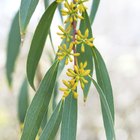
Eucalyptus Oil & Acne

Chasteberry for Acne

Golden Flax Seed Vs. Dark Flax Seed

Anise Seed Cautions and Side Effects

Hop Allergies

Herbs For Melasma
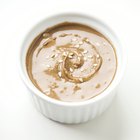
Tahini & Acne
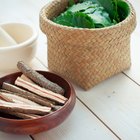
Neem Bark Benefits

Arnica for Acne
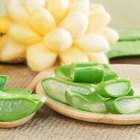
What Is Aloe Good For?
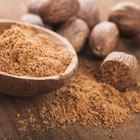
Nutmeg and Turmeric for Acne Scars

Aloe Vera Gel As a Wrinkle Reducer

The History of Butternut Squash

Metamucil Dosage for Cats

Can Borage Oil Help Acne?
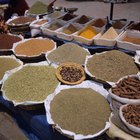
Nigerian Herbs & Spices
References
Resources
Writer Bio
Susan DeFeo has been a professional writer since 1997. She served as a community events columnist for New Jersey's "Cape May County Herald" for more than a decade and currently covers the family and pet beat for CBS Philadelphia. Her health, fitness, beauty and travel articles have appeared in various online publications. DeFeo studied visual communications at SUNY Farmingdale.
Photo Credits
Visage/Stockbyte/Getty Images